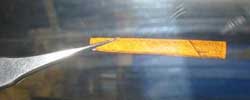Feb 7 2008
Professors Neal Skipper and Franco Cacialli, of the London Centre for Nanotechnology (LCN) and the Department of Physics & Astronomy, University College London (UCL), have been awarded a £200,000 laboratory refurbishment grant to help them develop alternative fuel supplies for transport and electricity generation. The Royal Society awarded the grant, with funding from the Wolfson Foundation under a scheme aiming to improve the UK’s research infrastructure.
 A sample of a hydrogen storage material to be further prototyped in the new Wolfson-funded laboratories. The material is carbon-based and is already close to meeting some of the DoE targets for hydrogen storage.
A sample of a hydrogen storage material to be further prototyped in the new Wolfson-funded laboratories. The material is carbon-based and is already close to meeting some of the DoE targets for hydrogen storage.
The refurbishment programme will create a new facility to enable the team to address two important issues in carbon emission reduction: the creation of cheap, efficient storage for hydrogen, and the development of large-surface organic solar cells.
Professor Richard Catlow, Dean of the Faculty of Mathematics and Physical Sciences at UCL commented “This grant will greatly contribute to the search for alternative fuels and efficient renewable energy supplies, therefore building on UCL's strong programme of energy research. I am delighted to hear that the Royal Society and Wolfson Foundation are generously funding the laboratory refurbishment that will make this work possible.”
One of the more challenging problems in energy research is to find a compact, safe and lightweight alternative to petroleum that has similar energy densities. There are a large number of different potential solutions to this problem, but the use of hydrogen has interesting possibilities in that it promises a clean, efficient form of energy storage.
However, for the hydrogen economy to be practical there are a several technological challenges to be overcome, many of which are associated with the materials used to store the hydrogen itself. The required performance targets for the storage material have been compiled by the US Department of Energy (DoE). These targets include the amount of hydrogen that can be stored, how easily the material can be filled and emptied, its cost, lifetime and safety. At the moment there are various different technologies under investigation, but at the moment no material meets even the 2005 goals. The refurbished laboratory will allow the researchers to investigate some very promising nanostructured carbon-based materials which are non-toxic, recyclable and should meet the DoE’s targets.
The other key energy challenge to be tackled in the new laboratory is the efficient generation of electricity from solar energy. Professor Cacialli is developing solar cells on organic substrates that can be made over large surfaces. Unlike the glass-like traditional solar cells made from silicon, organic photovoltaics can be flexible, resembling plastic materials. Being flexible, they can easily be applied on uneven surfaces, e.g. it may be possible to wrap a building with energy-producing solar cells, effectively turning walls into generators. The new facilities will allow researchers to improve the nanoscale electronic components of solar cells leading to an increase in their efficiency and output.
Professors Skipper and Cacialli remarked "We were delighted to hear about the award, since this will enable us to carry out the laboratory refurbishments needed to intensify our efforts in the burgeoning areas of excitonic solar cells and hydrogen storage".
The refurbished laboratory will be located at the UCL Department of Physics and Astronomy, in central London. The project will complement both UCL’s and the LCN’s growing portfolio of energy research projects which total more than £10 million of investment.